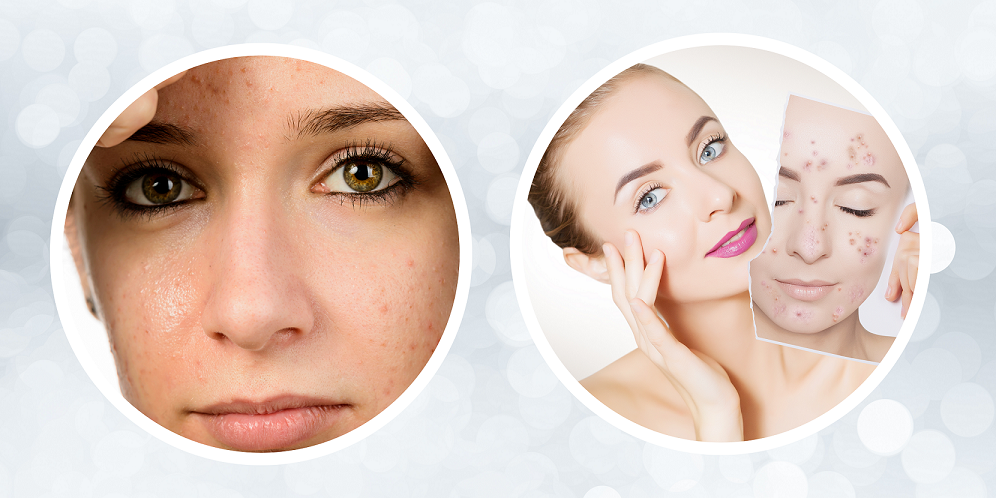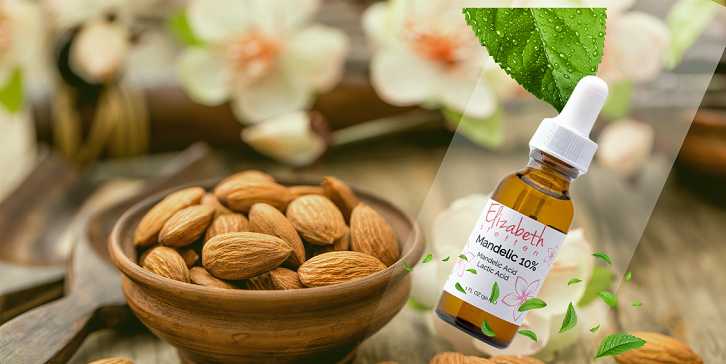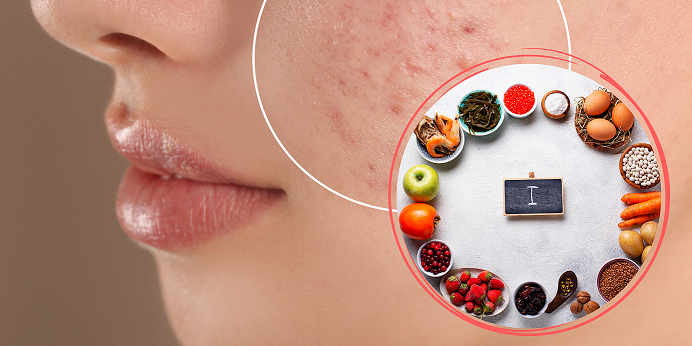
Understanding How Hormones Affect Acne: An In-Depth Look
Acne can be a frustrating and stubborn skin condition that affects people of all ages. While factors such as diet and stress can contribute to acne, hormones play a significant role in acne formation. As a licensed esthetician and acne specialist, I have extensively researched this topic, talked to hundreds of clients and seen results from clients who've made adjustments to their hormones (like using oral contraceptives). I'm excited to share with you this comprehensive guide on how hormones affect acne.
I'm a bit of a skin geek and in this blog I'll get into the science of hormones and acne and explore the unique challenges of managing hormonal acne. From estrogen to testosterone and everything in between, we will leave no stone unturned in this exploration of hormones' impact on acne. Whether you're looking to understand the root cause of your acne or seeking an effective acne treatment, this article has got you covered. I have to add a disclaimer, I am not a physician and will always recommend consulting a physician if you feel you have a hormonal imbalance.

Key Takeaways:
Hormones play a significant role in acne formation, including severe acne.
Excess sebum production and inflammation triggered by hormonal imbalances can contribute to acne.
Hormonal acne is a specific type of acne that is primarily caused by fluctuations in hormone levels.
Estrogen and testosterone both have unique effects on acne formation.
Effective management of hormonal acne may require professional guidance and personalized treatment plans.
What Causes Acne?
Acne is a common skin condition that affects people of all ages and sexes. It is primarily caused by a combination of factors that contribute to the formation of pimples, blackheads, and whiteheads. Adult acne and teen acne are similar but sometimes are different due to hormonal changes.
Acne is often triggered by an overproduction of oil, a key factor in skin health. The sebaceous glands naturally produce sebum to maintain skin hydration. Yet, an excessive sebum output can combine with dead skin cells, creating pore blockages. This, in turn, fosters the development of acne lesions like pimples, blackheads, and whiteheads.
Another significant cause of acne is bacteria. The skin naturally contains bacteria that live harmlessly on its surface. However, when pores become clogged, the bacteria can multiply and cause inflammation, leading to red, swollen pimples. The bacteria is feeding on the substances trapped inside the pores.
Inflammation is another major factor that contributes to acne formation. When the skin becomes inflamed due to clogged pores, the body produces an immune response that causes redness, swelling, and sometimes pain.
Other Factors That Can Contribute to Acne
In addition to excess oil production, bacteria, and inflammation, other factors can contribute to the development of acne.
- Hormonal changes, such as during puberty, pregnancy, birth control use, and menopause, can contribute to acne formation.
- Certain medications, including corticosteroids and androgens, can cause acne as a side effect.
- Diet may also play a role in acne development, with studies suggesting that high-glycemic diets, dairy products, iodides, and androgen-stimulating foods, like peanut butter, may exacerbate symptoms in some individuals.
- Stress can also contribute to acne formation by triggering the release of hormones that stimulate oil production.
The Role of Hormones in Acne Formation
As mentioned earlier, hormones play a crucial role in the development of acne. During puberty, hormone fluctuations can stimulate the sebaceous glands to produce more sebum. The excess sebum can then mix with dead skin cells and bacteria within the hair follicle, leading to the formation of pimples.
This process is further compounded by hormonal imbalances, which can trigger inflammation and make the acne symptoms worse. Hormonal imbalances can be caused by a variety of factors, including stress, diet, and certain medical conditions.
While hormonal changes play a major role in acne, it's essential to recognize they aren't the sole contributors. Other factors, such as excess oil production, clogged pores, bacterial presence, and inflammation, also play pivotal roles in the development of acne.
To effectively manage acne, it's crucial to understand the role of hormones in acne formation and address any hormonal imbalances contributing to the problem.

Understanding Hormonal Acne
When it comes to acne, not all breakouts are created equal. While some may be caused by external factors such as dirt and bacteria, others may be due to internal factors such as hormones. Hormonal acne is a specific type of acne that is primarily caused by fluctuations in hormone levels. It often manifests as deep, cystic pimples that can be painful and are resistant to conventional treatments.
So, what causes hormonal acne? As mentioned in the previous section, excess sebum production is one of the primary causes of acne. During puberty, hormonal changes stimulate the oil glands in the skin, leading to increased sebum production. In individuals who are prone to hormonal acne, excess sebum can clog pores and provide an ideal environment for bacteria to thrive, resulting in acne breakouts. Hormonal imbalances can also trigger inflammation, further exacerbating acne symptoms.
While hormonal changes during puberty are a common cause of acne, other factors can contribute to hormonal imbalances. Hormonal changes during the menstrual cycle, pregnancy, and menopause can all contribute to hormonal acne. Additionally, hormonal conditions such as polycystic ovary syndrome (PCOS) can cause elevated testosterone levels, making individuals more prone to hormonal acne. If you're a podcast listener, check out Episode 22: Does Birth Control Help Acne? of my podcast, Bombshell Beauty Rituals. I talk even more about hormones, including polycystic ovarian syndrome.
It is important to note that hormonal acne can affect individuals of all genders and ages. While it is most common in adolescents and young adults, some individuals may experience hormonal acne well into their 30s and 40s.
Estrogen and Acne
Estrogen is a primary female sex hormone that plays a significant role in the menstrual cycle, pregnancy, and menopause. Estrogen can have a protective effect on acne by regulating sebum production, minimizing pore-blocking, and maintaining a healthy skin barrier. However, imbalances in estrogen levels can also contribute to acne flare-ups.
During the menstrual cycle, estrogen levels fluctuate, with the highest levels occurring during the first half of the cycle. This increase in estrogen can suppress sebum production, leading to fewer breakouts. On the other hand, the drop in estrogen levels during the second half of the cycle can trigger an increase in sebum production, resulting in more acne flare-ups.
Similarly, hormonal birth control can affect estrogen levels and, therefore, acne. Combination pills that contain both estrogen and progestin can help regulate hormonal fluctuations, leading to fewer breakouts. However, progestin-only pills can have the opposite effect and increase acne breakouts in some individuals. I have seen firsthand what estrogen and progestin birth control can do for improving acne after switching from a progestin-only birth control.
It's essential to note that estrogen's impact on acne can vary depending on the individual's unique hormonal makeup. Some individuals may experience fewer breakouts with increased estrogen levels, while others may experience the opposite.
Testosterone and Acne
Testosterone is a hormone present in both males and females, but it's primarily known as a male sex hormone. Testosterone can stimulate the sebaceous glands in the skin to produce more sebum, which can lead to clogged pores and acne breakouts.
In females with hormonal imbalances such as polycystic ovary syndrome (PCOS), testosterone levels can become elevated, making them more prone to hormonal acne. In fact, studies have shown that up to 50% of women with PCOS experience acne. Many of my female acne clients often have this as an underlying health condition.
The conversion of testosterone to dihydrotestosterone (DHT) within sebaceous glands intensifies sebum production. This hormonal link is evident in puberty and persists into adulthood. Dermatologists may recommend topical treatments, contraceptives, or anti-androgen medications to manage hormonal acne effectively.
As an acne expert, I often recommend having my clients' hormones checked if I suspect hormonal imbalances. Most of the time, I can get people clear without hormone therapy, but sometimes the acne is just stubborn, and when that happens, I will refer out to a physician who specializes in hormones.
The Science Behind Testosterone and Acne
In a study published by the Journal of Investigative Dermatology, researchers found that testosterone can increase sebum production by stimulating the sebaceous glands in the skin. The study also found that when sebum mixes with bacteria on the skin, it can lead to inflammation and acne lesions.
One of the primary functions of estheticians is to increase cellular turnover. We do this using multiple types of ingredients that may include benzoyl peroxide, glycolic acid, lactic acid, mandelic acid, salicylic acid, and retinol. These ingredients, when used correctly, will exfoliate the debris found in the pore that is infected with the P. Acnes Bacteria. I have full programs with a starter acne kit that coaches you step by step on clearing your acne from home.
Testosterone can also affect the production of other hormones in the body, including estrogen. When testosterone levels are high, estrogen levels are often low, and this hormonal imbalance can contribute to acne flare-ups.

Managing Testosterone-Induced Acne
Managing testosterone-induced acne involves controlling the amount of sebum production and reducing inflammation in the skin. Here are some strategies that can help:
- Cleanse regularly: Regularly washing your face with a gentle exfoliating cleanser can help remove excess oil and bacteria from the skin. This is one of the best starting points for most of my clients.
- Avoid tight clothing: Wearing tight clothing can increase friction, leading to irritation and inflammation in acne-prone areas of the body.
- Consider hormonal therapy: In some cases, medical interventions such as hormonal therapy can be effective in managing testosterone-induced acne. Talk to your dermatologist about the best treatment options for you.
- Get on the right program: OK, I got to do my shameless plug for my acne coaching program. Even though I prefer to work in my spa with my acne clients, I can't treat everyone. So, I created a few Acne Coaching Programs that you can check out.
Managing testosterone-induced acne can be challenging, but with the right strategies and treatments, you can keep breakouts under control and achieve clearer, healthier skin.
Managing Hormonal Acne
Dealing with hormonal acne can be frustrating, but there are several ways to manage breakouts effectively. Here are some strategies that have worked for me:
1. Stick to a Consistent Skincare Routine
Establishing a consistent skincare routine can help prevent breakouts. Choose gentle, fragrance-free products that won't irritate your skin. Seek products featuring salicylic acid or benzoyl peroxide for their pore-clearing and anti-inflammatory properties. These ingredients can effectively address clogged pores and inflammation, aiding in the management of acne. Remember to cleanse your skin twice a day and always remove makeup before going to bed.
2. Practice Stress-Reduction Techniques
Stress can contribute to hormonal imbalances, which can trigger acne breakouts. Try stress-reduction techniques such as yoga, meditation, or deep breathing exercises to help manage stress levels. Regular exercise can also help keep stress levels in check.
3. Make Dietary Changes
Research suggests that certain foods can trigger acne breakouts. Consider reducing your intake of dairy products, high-glycemic-index foods, and foods that contain a lot of added sugars. Opt for a well-rounded diet rich in fruits, vegetables, and lean proteins for optimal health. While diet alone may not be a cure, it can complement other acne treatments. Individual responses vary, so consult with an acne specialist or healthcare professional for personalized advice.
4. Talk to Your Doctor about Hormonal Therapies
If your hormonal acne is severe, your doctor may recommend hormonal therapies such as birth control pills, spironolactone, or isotretinoin. These medications can help regulate hormone levels and reduce acne breakouts. However, they do come with potential side effects, so it's important to discuss the risks and benefits with your doctor before starting any new treatments. I've been able to see about a 95% success rate with clearing or greatly reducing acne, even when I've seen hormonal issues in my clients.
5. Consider Professional Treatments
If over-the-counter and prescription medications aren't effectively managing your acne, consider seeking professional help. Estheticians and Acne Specialists can provide a range of treatments, such as chemical peels and acne facials, which can help reduce acne symptoms. We can also offer advice on the best skincare products for your skin type.
Remember, managing hormonal acne takes time, patience, and persistence. But with the right approach, you can keep breakouts under control and enjoy clearer, healthier skin.

Seeking Professional Help for Hormonal Acne
If you have been struggling with hormonal acne and have tried several over-the-counter treatments and lifestyle modifications to no avail, seeking professional help can make a significant difference.
A dermatologist or an acne specialist can provide personalized treatment plans that can effectively manage your hormone-induced breakouts. They may recommend prescription medications such as topical retinoids, antibiotics, or hormonal therapies such as birth control pills or spironolactone.
It's important to note that some hormonal therapies require close monitoring and regular check-ups to ensure their effectiveness and safety. Your healthcare provider will work with you to find the most suitable treatment plan and monitor your progress throughout your acne journey.
Don't let stubborn hormonal acne affect your confidence and mental well-being. Seeking professional help can be a game-changer in achieving clearer, healthier skin.
Conclusion
Understanding the impact of hormones on acne is crucial for achieving clearer, healthier skin. By recognizing the role hormones play in acne formation, you can tailor you skincare routine and lifestyle choices to minimize breakouts and prevent future issues. Regular exercise, healthy eating habits, and stress reduction techniques can all help manage hormonal fluctuations contributing to acne. Consistent use of non-comedogenic skincare products, such as oil-free moisturizers and gentle, fragrance-free cleansers, can help prevent clogged pores and minimize inflammation.
However, if these lifestyle changes and over-the-counter treatments are ineffective, seeking professional help is an excellent option. Dermatologists and acne specialists can provide personalized treatment plans, including prescription medications or hormonal therapies. Remember, managing hormonal acne is an ongoing process that requires patience and consistency.

FAQ's
What causes acne?
Acne is primarily caused by factors such as excess oil production, clogged pores, bacteria, and inflammation.
How do hormones affect acne?
Hormones play a crucial role in acne formation. During puberty, hormonal changes stimulate the oil glands in the skin, leading to increased sebum production. Hormonal imbalances can also trigger inflammation, further exacerbating acne symptoms.
What is hormonal acne?
Hormonal acne is a specific type of acne that is primarily caused by fluctuations in hormone levels, such as during the menstrual cycle, pregnancy, or menopause.
What is the role of estrogen in acne?
Estrogen, a primary female sex hormone, can have a protective effect against acne. It helps regulate sebum production, minimizes pore-blocking, and maintains a healthy skin barrier. However, imbalances in estrogen levels can contribute to acne flare-ups.
How does testosterone contribute to acne?
Testosterone, a male sex hormone present in both males and females, can stimulate the sebaceous glands to produce more sebum. Excess sebum can clog pores, leading to acne breakouts. Hormonal conditions such as polycystic ovary syndrome (PCOS) can cause elevated testosterone levels, making individuals more prone to hormonal acne.x
How can I manage hormonal acne?
While hormonal acne can be challenging to manage, there are various strategies you can employ. Lifestyle modifications, skincare routines, and medical interventions can all help keep breakouts under control. It's important to find the strategies that work best for you.
When should I seek professional help for hormonal acne?
If over-the-counter treatments and lifestyle changes don't effectively address your hormonal acne, it may be time to seek professional help. Dermatologists and acne specialists can provide personalized treatment plans, including prescription medications or hormonal therapies.
How can I take control of my skin's health?
Understanding the impact of hormones on acne is crucial for effective management. By recognizing the role hormones play in acne formation, you can tailor your skincare routine and lifestyle choices to minimize breakouts. Start your journey towards clearer, blemish-free skin today!



